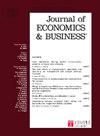How does digital financial inclusion affect households’ CO2? Micro-evidence from an emerging country
IF 3.4
Q1 BUSINESS, FINANCE
引用次数: 0
Abstract
This paper examines, at the micro-level, the relationship between digital financial inclusion and households’ CO2 emissions, aiming to investigate the connection between financial inclusion and the environment. Exploiting a unique survey panel dataset of 13,624 Chinese households, I find that digital financial inclusion can increase households’ CO2 emissions, and this result is applicable to other emerging countries. Further analysis based on the mediation model sheds light on how digital financial inclusion influences direct and indirect households’ CO2 emissions, respectively. Specifically, digital financial inclusion encourages non-renewable energy consumption, thereby increasing households’ direct CO2 emissions. Simultaneously, it promotes subsistence and development consumption upgrades, contributing to increased households’ indirect CO2 emissions. Moreover, the study reveals that the impact of digital financial inclusion is heterogeneous. The environmental deterioration effect of digital financial inclusion is mainly driven by the actual uses of different services. As digital financial inclusion develops, its environmental detriment intensifies. Also, in cities where the Carbon Trade Policy (CTP) is implemented, digital financial inclusion can significantly reduce CO2 emissions. Overall, the findings have several implications for addressing environmental problems in developing countries.
数字普惠金融如何影响家庭的二氧化碳排放?来自新兴国家的微观证据
本文从微观层面考察数字普惠金融与家庭二氧化碳排放之间的关系,旨在探讨普惠金融与环境之间的联系。利用13624个中国家庭的独特调查面板数据,我发现数字普惠金融会增加家庭的二氧化碳排放,这一结果也适用于其他新兴国家。基于中介模型的进一步分析揭示了数字普惠金融如何分别影响家庭的直接和间接二氧化碳排放。具体而言,数字普惠金融鼓励了不可再生能源的消费,从而增加了家庭的直接二氧化碳排放量。同时,它促进了生存性和发展性消费升级,增加了家庭间接二氧化碳排放。此外,研究表明,数字普惠金融的影响是异质的。数字普惠金融的环境恶化效应主要由不同服务的实际使用驱动。随着数字普惠金融的发展,其对环境的危害也在加剧。此外,在实施碳交易政策(CTP)的城市,数字普惠金融可以显著减少二氧化碳排放。总的来说,这些发现对解决发展中国家的环境问题有几点启示。
本文章由计算机程序翻译,如有差异,请以英文原文为准。
求助全文
约1分钟内获得全文
求助全文
来源期刊

JOURNAL OF ECONOMICS AND BUSINESS
BUSINESS, FINANCE-
CiteScore
6.20
自引率
2.60%
发文量
31
期刊介绍:
Journal of Economics and Business: Studies in Corporate and Financial Behavior. The Journal publishes high quality research papers in all fields of finance and in closely related fields of economics. The Journal is interested in both theoretical and applied research with an emphasis on topics in corporate finance, financial markets and institutions, and investments. Research in real estate, insurance, monetary theory and policy, and industrial organization is also welcomed. Papers that deal with the relation between the financial structure of firms and the industrial structure of the product market are especially encouraged.
 求助内容:
求助内容: 应助结果提醒方式:
应助结果提醒方式:


